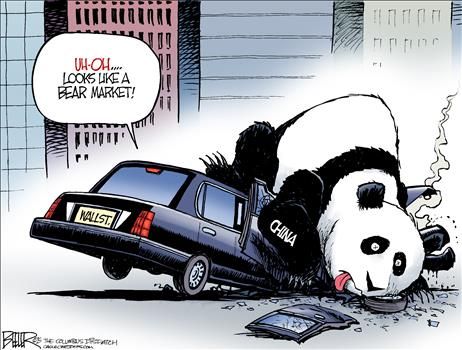
It’s too early to know if the stock market drop is just one of the periodic corrections by which the market reallocates capital to more profitable uses, or the start of a more dramatic contraction signaling a long-term decline. In any case, if the roller coaster ride of the last few days goes on much longer, investors will need strong stomachs to stay the course. Still, Monday’s dramatic drop comes after a long period in which U.S. stock indexes have risen over 200 percent. The market has given up only a small part of those gains ..
We can’t know what stock prices will be later today or tomorrow, but there are some things that conservatives should know about what is happening and what the government should or should not be doing about it. Here are three:
1. Short-term swings in the stock market are usually temporary and mean very little outside Manhattan. Jobs, prices, and growth are what matter to Americans. We don’t need government action to “fix” the stock market. Government is not blameless, however. The current turmoil in world stock markets reflects reduced investor confidence, and that, at least in part, is due to bad government policies that have misallocated resources and slowed growth. Misguided policies have included a government-directed explosion of public and private debt in China, government overspending in Greece and elsewhere in the eurozone, and debilitating regulatory financial and environmental overreach in the U.S.
2. There is no government “cure” for stock market turmoil. Free markets are the most efficient means for allocating capital efficiently. Government interventions that constrain economic freedom or try to boost investment in certain sectors are far more likely to do harm than good. However, government actions to unwind misguided economic policies would contribute to increased growth. For China, that means opening capital markets and privatizing state-owned enterprises. For Europe, the need is to rein in welfare spending that saps productivity. For the U.S., where an unprecedented expansion of the regulatory state has led to low rates of investment and high levels of unemployment and underemployment, repeal of the Dodd–Frank financial regulations, Obamacare, and the growth-stifling explosion of Environmental Protection Agency rules are urgent priorities.
3. The proximate cause of the current turmoil is the deceleration of growth in China. That’s bad for China, but it is bad for the U.S., too. The U.S. and China are not economic rivals, but rather complementary economic powers that are likely to succeed or fail together. It’s good for America when China prospers economically and good for China when America’s economy expands rapidly. Protectionist policies that interfere with trade and financial interactions between the U.S. and China hurt both countries.
Markets rise and fall all the time. Monday’s drop is not all that unusual, and certainly not reason to panic. There are, however, a number of reasons why investors should be concerned about future market movements. Number one among those is the global slowdown in growth attributable at least in part to failed government policies.
Governments can do something about that. If policymakers desire strong stock markets, they should implement policies that restore economic freedom. That means reducing the size and scope of government and fostering an environment where the private sector can grow without the constant interference of regulations, paperwork, and bureaucrats.
[bold and italics emphasis mine]
Terry Miller - Ambassador Terry Miller is the Director of the Center for International Trade and Economics (CITE) at The Heritage Foundation.
"How US Should Respond to China’s Stock Market Collapse" - William T. Wilson / August 24, 2015 ; http://dailysignal.com/2015/08/24/how-us-should-respond-to-chinas-stock-market-collapse/
" ....First of all, the stock market is not the economy, and short-term swings tell us very little about what is going on in terms of jobs and growth.There is no need for a U.S. policy response to short-term fluctuations in the stock market..."
"This is a perfect time for the U.S to reclaim the title of global economic leader through our own structural reforms. Reigning in long-term entitlement spending, simplifying the corporate and individual tax codes, and removing much of the burdensome regulation that hampers business and venture capital would easily accomplish that task. Despite the global turmoil, the time to move is now."






No comments:
Post a Comment